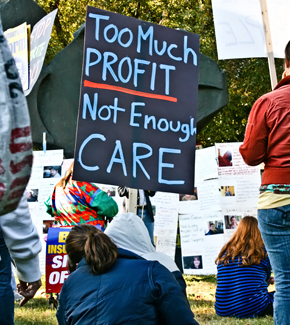Health Insurers Sacrifice Americans for Profit
Three of the biggest health insurers have announced quarterly earnings in the past few days. If Americans were able to eavesdrop on what executives from those firms tell their Wall Street masters every three months, they would have a better understanding of why premiums keep going up while the number of people with medical coverage keeps going down.
 It only takes three words, when you get right down to it, to describe the real of those folks: profits over people.
It only takes three words, when you get right down to it, to describe the real of those folks: profits over people.
CIGNA and Humana are scheduled to report earnings this week. The three companies that have already spoken -- UnitedHealth, WellPoint and Aetna -- earned a combined $2.51 billion from April through the end of June, more than analysts expected. On a per share basis, their earnings were up more than 17 percent on average compared with the second quarter of 2010.


 ABC is dominating other news outlets this summer with stories about pretty, white women in distress. The network's special about former kidnap victim J.C. Dugard garnered 15 million viewers, which prompted ABC to re-broadcast it at a later time and date. ABC sent out a press release boasting that its primetime Nightline special about then-accused child-killer Casey Anthony won the network biggest audience it has had in that time slot in five months. After paying Anthony $200,000 years ago for video and pictures to help bolster her story, ABC held nothing back after Anthony was acquitted, grabbing the first juror willing to speak to cameras and having Barbara Walters interview Anthony's attorney on TV. ABC devoted more than twice as much time to the Casey Anthony story as either of its two rival broadcast networks (22.9 minutes, compared to NBC's 8.4 minutes and 5.4 minutes on CBS). ABC even
ABC is dominating other news outlets this summer with stories about pretty, white women in distress. The network's special about former kidnap victim J.C. Dugard garnered 15 million viewers, which prompted ABC to re-broadcast it at a later time and date. ABC sent out a press release boasting that its primetime Nightline special about then-accused child-killer Casey Anthony won the network biggest audience it has had in that time slot in five months. After paying Anthony $200,000 years ago for video and pictures to help bolster her story, ABC held nothing back after Anthony was acquitted, grabbing the first juror willing to speak to cameras and having Barbara Walters interview Anthony's attorney on TV. ABC devoted more than twice as much time to the Casey Anthony story as either of its two rival broadcast networks (22.9 minutes, compared to NBC's 8.4 minutes and 5.4 minutes on CBS). ABC even